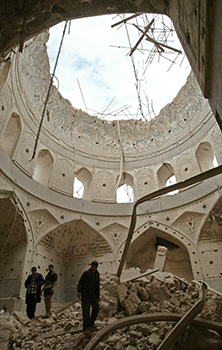Islamic Jihadists Again Battling for Control of Iraq’s Anbar Province
January 2, 2014
Special Iraqi security forces are battling jihadist militants in the Iraqi cities of Fallujah and Ramadi. The militants have reportedly taken over swaths of both cities. Fallujah and Ramadi are in Anbar province, a stronghold for Sunni Muslims that has been especially difficult to control since the 2003 U.S. invasion of Iraq. The militants are members of the Islamic State of Iraq and the Levant, which is connected to the al-Qa`ida terrorist network. An Iraqi police officer reported to a BBC correspondent today that the militants have seized at least 10 police stations and freed a number of prisoners.
Sunni tribal fighters are reported to have also taken to the streets, many fighting on the side of the government. They also did this at the time of U.S. military surge in Iraq in an attempt to rein in the chaos engulfing the region. (The surge refers to President George W. Bush’s 2007 increase in the number of American troops in Iraq to control sectarian violence and bring Anbar province under control.) The latest violence began last Saturday (Dec. 28, 2013) in Ramadi, when security forces arrested a prominent Sunni member of parliament.
The initial round of sectarian violence in Iraq began in February 2006 with the bombing of the al-Askari Mosque in Samarra, one of the holiest sites in Shi`ite Islam. The bombing, carried out by the Sunni militant group al-Qa`ida in Iraq, triggered a wave of Shi`ite reprisals against Sunnis, followed by Sunni counterattacks. At the height of the violence in 2006 and 2007, the monthly death toll regularly topped 1,000.

Iraqis inspect the ruins of the al-Askari shrine in Samarra, north of Baghdad. The 2006 bombing of the shrine led to violence between Sunni and Shi`ite Muslims (AP/Wide World).
Tensions between Iraq’s minority Sunnis and majority Shi`ites escalated again in 2012 in the wake of the withdrawal of U.S. forces from Iraq in December 2011. Yesterday, the United Nations reported that 8,868 people died in sectarian violence in Iraq in 2013. Iraq Body Count, a British-based organization that has tracked violence in Iraq since 2003, recorded 9,475 civilian deaths in 2013 and issued this warning: “If current violence levels continue unabated throughout the coming year, then 2014 threatens to be as deadly as 2004, which saw the two sieges of Fallujah [by U.S. forces in April and November of that year] and Iraq’s [sectarian] insurgency take hold.”
Additional World Book articles:
- The War in Iraq (a special report)
- Iraq 2006 (a Back in Time article)
- Iraq 2007 (a Back in Time article)
- Iraq 2008 (a Back in Time article)
- Iraq 2012 (a Back in Time article)


